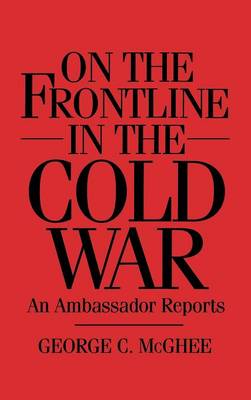The Cold War, which started in 1947, resulted from the United States' gradual discovery that the Soviets, allies during World War II, were enemies, hostile to non-Communist nations and determined to spread Communism wherever they could. The Soviets feared another revival of German nationalism and sought to defend themselves against another German invasion. The U.S. and its allies created NATO to balance a Soviet military buildup, including the nuclear arms race. The first confrontation with Communist guerrilla action in Greece and Soviet threats against Turkey were followed by Communist party threats to overthrow democratic governments in France and Italy and later all around the world. The U.S. supplied vast military and economic assistance to thwart their efforts. The Soviet government, consequently, felt obliged to assist governments whom they considered threatened by the imperialists, principally the United States.
In this insider's account of the Cold War, Ambassador George McGhee outlines how the 43-year Cold War emerged unexpectedly in 1947. McGhee follows the standoff in Europe and the Far East, the competition in the developing world, including the shooting wars fought in Korea and Vietnam in which the U.S. lost 111,000 lives. McGhee personally directed Greek-Turkish Aid, the first American effort to contain the Soviets. He also led the movement to get Greece and Turkey into NATO, using them as a bulwark against encroachment in the Middle East. McGhee accounts, using his hitherto unpublished field notes taken while he was special assistant to the Secretary of State, his attempts to cope with the Arab Refugee problem and the hostilites that followed the emergence of the state of Israel. McGhee served in Guam with Curtis LeMay and was involved in the bombing of Japan and the dropping of nuclear bombs on Hiroshima and Nagasaki. He negotiated with Nehru, Haile Selassie, the Shah of Iran, and Ibn Saud to protect U.S. interests in the Middle East. In addition, he negotiated with Tshombe in the 1962 Cong crisis, diverting a Soviet threat. He was also U.S. ambassador to Germany from 1963 to 1968, when U.S. forces reached 250,000 in Europe.
- ISBN10 0275956490
- ISBN13 9780275956493
- Publish Date 28 January 1997
- Publish Status Active
- Publish Country US
- Publisher ABC-CLIO
- Imprint Praeger Publishers Inc
- Format Hardcover
- Pages 240
- Language English
